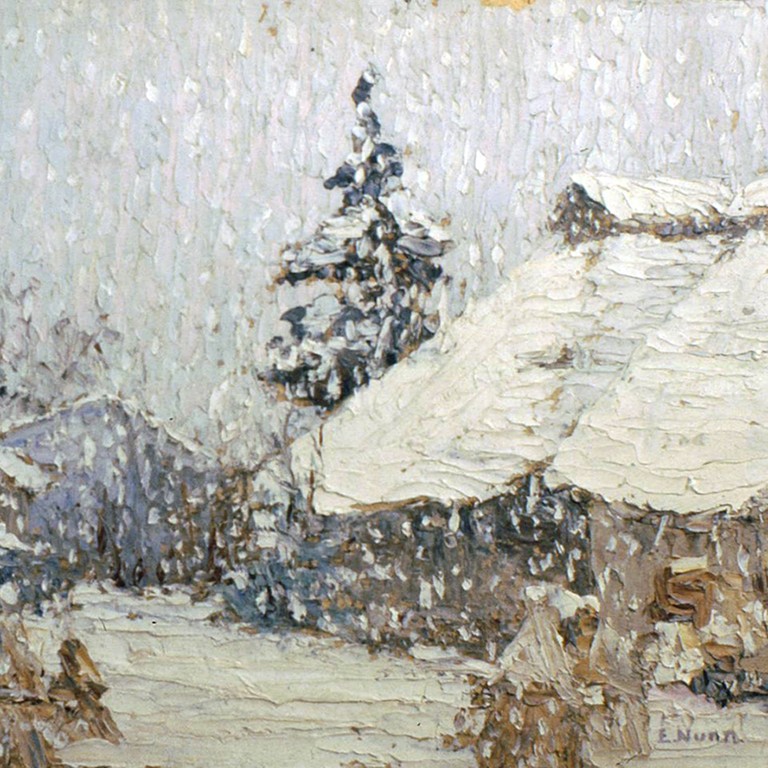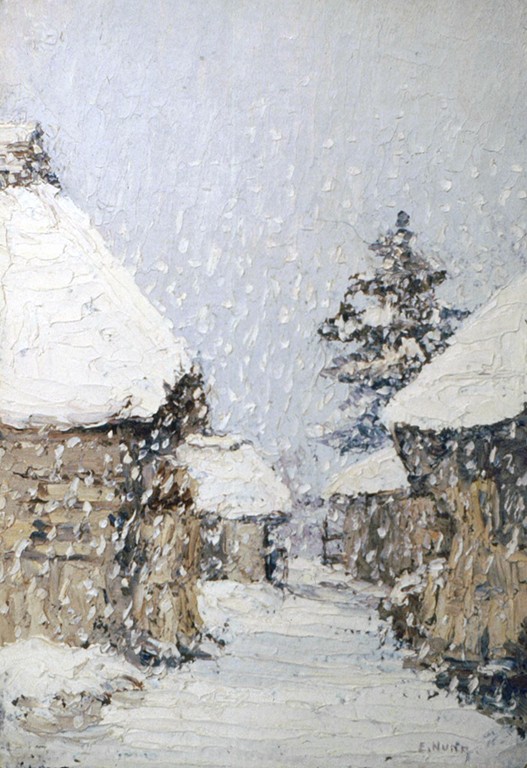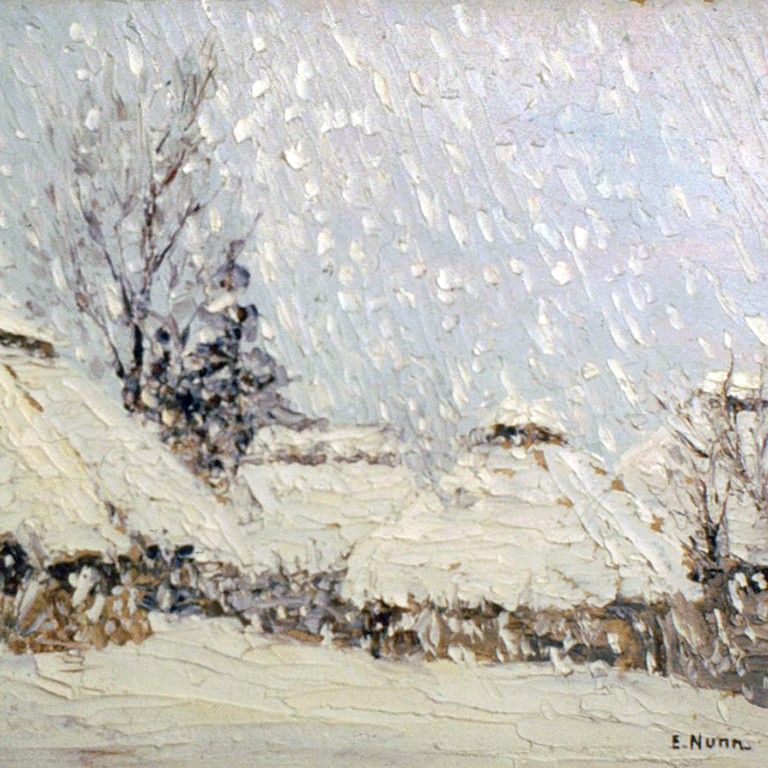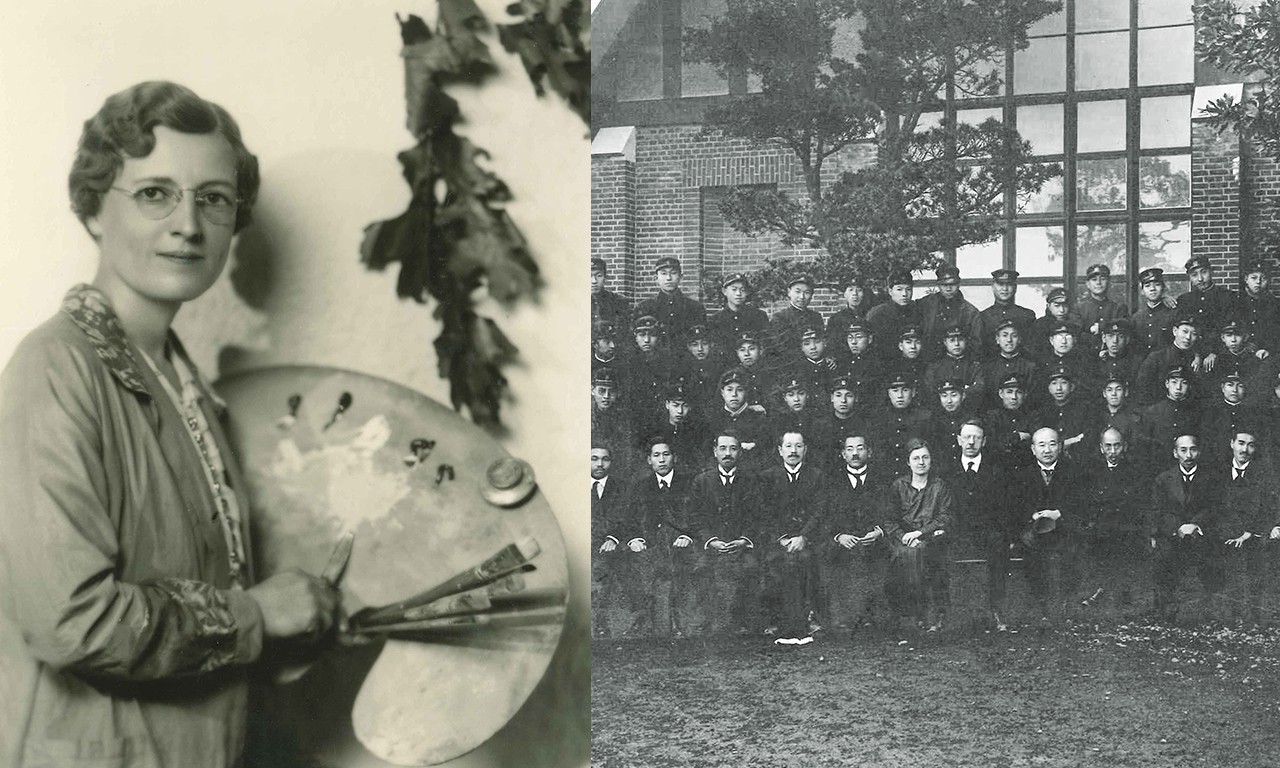© 2023 Kreativa. All rights reserved. Powered by JoomShaper
Takes One to Snow One: Evylena Nunn Miller’s Oils of Japan in Winter
 |
| Winter in Mastumoto City, 1920-1922 Evylena Nunn Miller (American, 1888-1966); Matsumoto, Nagano Prefecture, Japan Oil on cardboard; 10 x 14 in. 31804.12 Evylena Nunn Miller Memorial Collection |
A Fifth
Those of us looking out our windows in California may as well have forgotten that under the right cold-weather conditions, water can become snow, however, our country’s east coast is currently being violently tucked under a blanket of several feet of the stuff. This post takes the opportunity to celebrate just how beautiful snow can be under the right conditions and harken in the coming of winter, which—despite the head start—officially begins on December 21. We also remedy what has been a significant oversight in Bowers Blog posts since the platform was kicked off in 2006: lack of a dedicated post on Evylena Nunn Miller who is one of the key constituents in the Bowers early years, and creator of a whopping 20.63% of all the works of fine art in the Bowers Museum’s permanent collections.
 |
 |
 |
| Three Scenes of a Snowstorm in Japan, 1921 Evylena Nunn Miller (American, 1888-1966); Japan Oil on cardboard 31809.1-.3 Evylena Nunn Miller Memorial Collection |
||
Not in Kansas Anymore
Like so many California artists of the early 20th Century, Miller arrived only after her family completed their multi-generational transit of the United States sometime around 1903. Moving in part for the health of her mother, the family settled in Santa Ana, California which would become Miller’s base of operations throughout the rest of her life. There she attended Santa Ana High School and graduated in 1906. After going on to earn a Bachelor’s in Art at Pomona College in Claremont, she taught at several schools in Los Angeles before returning to Orange County and becoming the first Art Director at her old alma mater. It was during this time that she began a lifelong habit of volunteering with organizations and was involved with at least ten different art clubs throughout her life, most notably a founding member of the both the Laguna Beach Art Association and Women Painters of the West, and a long-standing member of the Bowers Museum’s Board.
 |
| Photographs of Evylena Nunn Miller and her husband in Japan |
Rain or Shrine
Two years after moving back to Santa Ana, Miller was off again, embarking on what was supposed to be a semi-brief trip around the world with a six month stay in Japan. Time got away from her when she fell in love with the country and lived in Tokyo for two years, teaching at the Presbyterian Mission School and studying under Jipto Araki, the head of the Imperial Exhibition Committee. While there she traveled the country from north to south, capturing scenes in plein air and in some cases taking them back to her studio to paint larger oils on canvas. She herself exhibited in the country through the Imperial Exhibition Committee. She was particularly drawn to the types of scenes seen in this post: rural villages, temples, and shrines; inclement weather or the remnants thereof; and solitary locals making for romanticized but lonely works. A portion of her paintings from the time—reliant on the season of course—were as snow-covered as the east coast is now.
World Tour Delayed
In 1922 she finally left Japan for China, Egypt, and the Holy Land, followed by many stops in Europe before ultimately sailing back to America and marrying Howard Earl Miller, a U.S Customs Agent working out of Los Angeles. About a decade later she published Evylena Nunn Miller’s Travel Tree, which included many sketches and stories from her adventure. The couple were frequent travelers to the US National Parks, where Nunn Miller painted en plein air. After the voluminous mountain of works painted during her great trip, the pueblos of the American Southwest formed the second largest body of her work. She continued to exhibit throughout the United States and internationally during her lifetime and was an avid self-promoter. Perhaps the most noteworthy story relating to her involves the Bowers’ Martha C. Stevens collection. Miller had one of her works included in the retrospective exhibition because barring slightly different circumstances “they would have collected her works.”
|
|
|
| Snow-Clad Temple, 1920-1922 Evylena Nunn Miller (American, 1888-1966); Japan Oil on cardboard; 10 x 14 in. 31803.6 Evylena Nunn Miller Memorial Collection |
Secluded Temple of Japan In Winter, 1920-1922 Evylena Nunn Miller (American, 1888-1966); Japan Oil on canvas; 32 x 37 in. 31761 Evylena Nunn Miller Memorial Collection |
Tears in Rain
When Miller died in 1966 her husband was heartbroken and donated almost all her possessions to the Bowers. This included over 300 paintings and about 400 other odds and ends ranging from awards to a locally farmed ostrich egg. Despite having been involved in so many organizations and having a painting in the Smithsonian’s collections, Miller has fallen somewhat into anonymity. Many of her works in the Bowers collections were essentially palette knife sketches on readily available substrates like cardboard. In the case of Snow-Clad Temple and Secluded Temple of Japan In Winter we can see that she turned some of them into oil paintings in her studio, but the vast majority never went beyond cardboard. Having unfairly been charged with standing the test of time, one can see in this post that many of these works were already suffering various degrees of degradation prior to being donated. Much like the snow she paints, these works would eventually have disappeared entirely without some form of intervention.
Text and images may be under copyright. Please contact Collection Department for permission to use. References are available on request. Information subject to change upon further research.

Comments